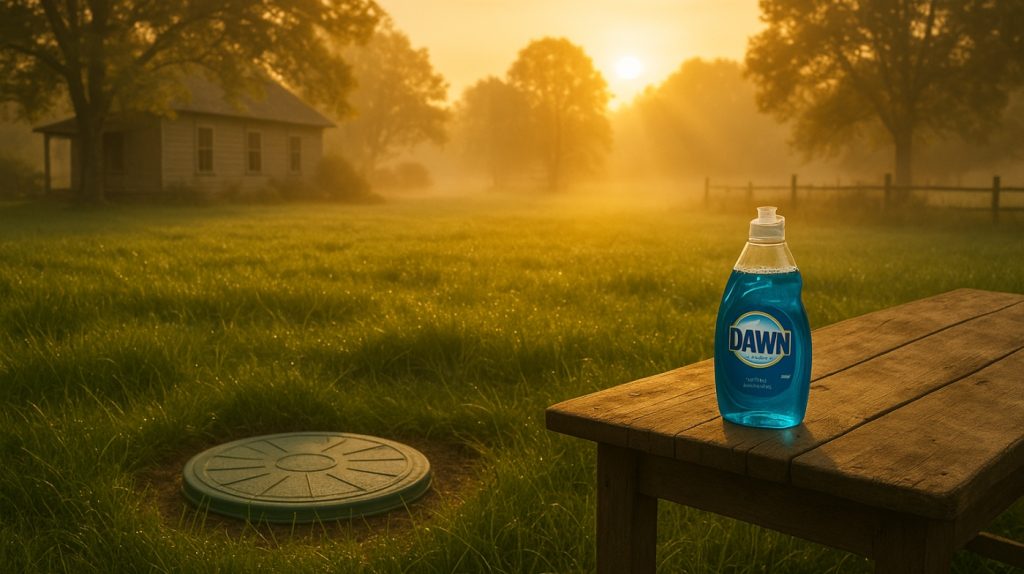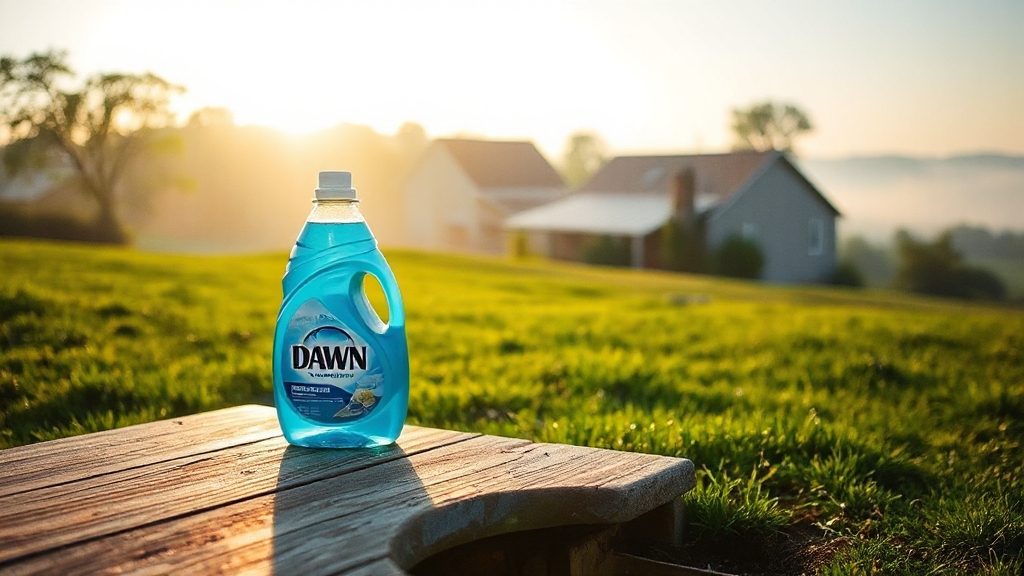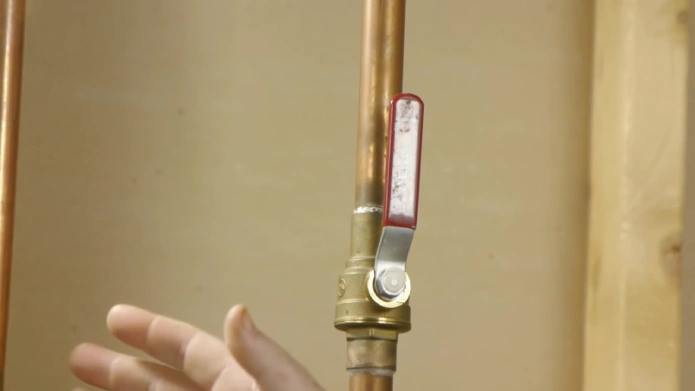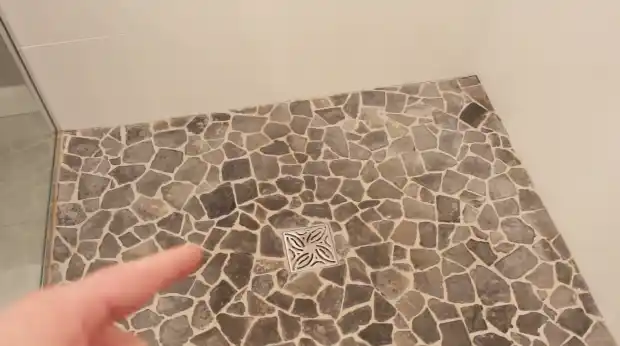Last Updated on May 13, 2025
You can use Dawn dish soap safely in your septic tank if you keep usage moderate and select phosphate-free, biodegradable formulas.
Dawn’s mild surfactants minimize harm to vital septic bacteria needed for waste decomposition, and it contains no antibacterial agents that might disrupt microbial balance.
Overuse can still stress the system, so avoid excess quantities and harsh chemical combinations. Understanding how Dawn compares to other soaps and best practices will help you maintain a healthy, efficient septic system.
Key Takeaways
- Dawn dish soap contains biodegradable surfactants but is not fully biodegradable, so moderate use is recommended for septic safety.
- It is phosphate-free and lacks antibacterial agents, helping preserve essential septic system bacteria.
- Excessive use of Dawn can increase surfactant levels, potentially stressing septic microbes and disrupting microbial balance.
- Use only septic-safe Dawn variants, avoid combining with harsh chemicals, and follow dilution guidelines to protect the septic system.
- Regular septic maintenance and monitoring system performance help mitigate any negative effects from Dawn use.
Biodegradability and Environmental Impact of Dawn Dish Soap
Although Dawn dish soap contains biodegradable surfactants, as the manufacturer states, it isn’t fully biodegradable due to other non-surfactant ingredients in its formula.
These additional components lack third-party biodegradability certification, which raises concerns about their persistence in the environment. You should note that the biodegradable claims apply solely to the surfactants, not the entire formulation.
This partial biodegradability means that some ingredients could contribute to groundwater contamination risks. The manufacturer also doesn’t specify the surfactant biodegradability timeframe, limiting your ability to assess its environmental impact fully.
Procter & Gamble has made a commitment to sustainability in operations, which includes efforts to improve product eco-friendliness.
Consequently, while Dawn offers some eco-friendly features, its overall biodegradability remains incomplete and potentially hazardous, especially when considering long-term ecological effects and the absence of thorough lifecycle assessments.
Effects of Dawn Dish Soap on Septic System Bacteria
Understanding the biodegradability of Dawn dish soap’s components sets the stage for evaluating its direct impact on septic system bacteria. Dawn lacks antibacterial agents, preserving the essential microbial populations that drive waste decomposition.
Its mild surfactants minimize disruption to these microbial communities compared to harsher detergents. Additionally, the formulation excludes phosphates, which commonly impair bacterial function.
While biodegradable components naturally break down without harming bacterial colonies, excessive use may increase surfactant concentrations, potentially stressing bacteria over time.
Moreover, using phosphate-free detergents like Dawn is safer for septic systems and helps prevent groundwater contamination. Dawn’s low-foam, non-toxic variants support both aerobic and anaerobic digestion processes without introducing enzymes or bleach that could disrupt bacterial activity.
For peak bacterial health, you should use Dawn moderately, avoid antibacterial variants, and follow dilution guidelines, ensuring that septic system microbial balance remains stable during routine household cleaning.
Comparing Dawn With Other Dishwashing and Cleaning Products
When comparing Dawn with other dish soaps like Ivory, you’ll notice differences in chemical composition, including surfactant concentration and additive types that influence cleaning efficiency and environmental impact.
Dawn formulations emphasize biodegradability and reduced ecological footprint, whereas others may not prioritize these factors as strongly.
In particular, Dawn uses biodegradable surfactants designed to reduce environmental impact. Understanding these distinctions helps you assess their relative effects on septic systems and surrounding environments.
Chemical Composition Differences
Since the effectiveness and safety of dish soaps depend heavily on their chemical makeup, comparing Dawn’s formulation with other products reveals key differences in surfactants, pH adjusters, preservatives, and viscosity modifiers.
Dawn combines sodium lauryl sulfate, sodium laureth sulfate, and C10-16 alkyldimethylamine oxide, whereas others rely on varying surfactants, including plant-based variants. Dawn uses sodium hydroxide for pH adjustment, differing from Ivory’s phenoxyethanol and methylisothiazolinone preservatives.
Viscosity modifiers like sodium chloride and PPG-26 stabilize both formulations, but other brands may employ alternatives. As a digital tool, Smart Label helps consumers access detailed product information, which can clarify the chemical composition differences among cleaning products.
| Component | Dawn |
|---|---|
| Surfactants | Sodium lauryl sulfate, sodium laureth sulfate, C10-16 alkyldimethylamine oxide |
| pH Adjuster | Sodium hydroxide |
| Preservatives | Generally unspecified, possibly similar to Ivory’s |
| Viscosity Modifiers | Sodium chloride, PPG-26 |
Environmental Impact Comparison
Although many dish soaps claim to be environmentally friendly, their impact on septic systems varies considerably. Dawn stands out due to its phosphate-free, biodegradable formula that minimizes disruption to septic bacteria, preserving system efficiency.
In contrast, soaps containing phosphates or harsh chemicals can harm bacterial balance, increasing maintenance needs and risking groundwater contamination. Non-biodegradable products, like certain laundry detergents, pose clogging hazards and long-term system damage.
Additionally, Dawn’s mild formulation reduces ecological harm by supporting local microorganisms essential for septic function. Its biodegradable formula breaks down into natural substances over time, further reducing environmental impact.
You’ll find that while natural alternatives offer lower environmental footprints, Dawn balances cleaning power with septic safety effectively.
Hand Washing vs. Automatic Dishwashing: Impact on Septic Systems
Because Dawn dish soap contains biodegradable ingredients with minimal phosphates and no antibacterial agents, both hand washing and automatic dishwashing can be compatible with septic systems if used properly.
Dawn’s formulation is well-known for being septic-friendly, which helps maintain the necessary bacterial balance. However, hand washing typically uses more water, increasing wastewater volume and potentially stressing your septic system.
Automatic dishwashers, designed to conserve water, produce less effluent, reducing hydraulic load on the tank. Despite higher energy consumption, they limit chemical concentration in wastewater, preserving bacterial balance essential for septic function.
Excessive detergent use in either method risks disrupting microbial activity, so moderation is key. Ultimately, selecting Dawn for both processes supports septic health, but automatic dishwashing offers a more efficient balance between water usage and maintaining the delicate biological environment within your septic system.
Best Practices for Maintaining a Healthy Septic System
You should schedule regular septic inspections and pumping based on usage to prevent system overload and failure. Licensed contractors must perform these tasks due to toxic fumes.
Regular Septic Maintenance
A well-maintained septic system relies on regular inspections, timely pumping, and diligent monitoring to function effectively and avoid costly failures.
You should schedule annual inspections with licensed contractors to detect issues early and pump the tank every three to five years based on usage and size. Keep the septic tank manway or cover accessible for regular inspections and maintenance to ensure easy access when needed septic tank access.
Conduct visual checks for odors or unusual vegetation near the drainfield, and keep detailed records of all maintenance activities. Protect the drainfield by diverting surface water, preventing vehicle traffic, and avoiding soil compaction to maintain oxygen flow essential for bacterial activity.
Manage water use carefully—fix leaks promptly and use efficient appliances to reduce system strain. Adhering to these technical practices guarantees system longevity, prevents overload or damage, and maintains regulatory compliance, safeguarding both your property and the environment.
Choosing Septic-Safe Products
How can you guarantee the cleaning products you use won’t harm your septic system? Start by selecting products labeled as septic-safe and biodegradable, such as Dawn dish soap, which contains biodegradable ingredients and low phosphate levels.
Dawn dish soap is also EPA Safer Choice certified, ensuring both safety and effectiveness for septic systems. Avoid antibacterial agents that disrupt the microbial balance essential for waste breakdown. Use soaps sparingly; excessive quantities can inhibit bacterial activity and reduce system efficiency.
Always check labels to confirm phosphate-free formulations, as phosphates contribute to harmful algae growth. Consider natural alternatives like distilled white vinegar or baking soda for cleaning tasks.
Educate household members on these practices to maintain a stable bacterial environment. By adhering to these precise product choices and usage guidelines, you preserve the septic system’s biological integrity, preventing costly failures and ensuring long-term functionality.
Minimizing Water Usage
Since every drop of water entering your septic system requires treatment, minimizing water usage plays a critical role in maintaining its functionality and preventing overload. You should promptly fix leaks, as even minor drips can introduce hundreds of gallons daily, stressing the system.
A leaky faucet dripping once per second can waste 3,000 gallons a year, significantly impacting septic health. Installing water-efficient fixtures like low-flow showerheads and faucet aerators reduces inflow without compromising household needs.
Running full loads in washing machines and practicing efficient dishwashing further conserves water. Adjusting habits, such as staggering water use and avoiding sudden surges, optimizes septic tank retention time, enhancing bacterial breakdown and treatment efficiency.
Guidelines for Using Dawn Dish Soap Safely With Septic Tanks

When you use Dawn dish soap with your septic system, following specific guidelines guarantees you protect its microbial balance and prevent damage. Use only septic-safe variants with low phosphate content (<0.5%) and avoid antibacterial formulas to preserve essential bacteria.
Maintain this balance because bacteria in the tank break down solids and maintain system health. Measure and limit soap quantities, especially with concentrated liquids, to prevent microbial disruption and reduce water inflow. Rinse minimally to avoid excessive dilution.
Never combine Dawn with bleach or harsh chemicals that can harm the tank’s ecosystem. Install pretreatment filters to capture solids and maintain regular pumping every 3–5 years. Monitor system performance for drainage issues or foaming, and if overuse occurs, test bacterial levels and consider septic boosters.
Frequently Asked Questions
Can Dawn Dish Soap Be Used to Clean Septic System Components?
You shouldn’t use Dawn dish soap to clean septic system components. Although it’s biodegradable, it’s not formulated for septic maintenance and could disrupt delicate materials or bacterial balance if misapplied.
Instead, rely on specialized septic-safe cleaners or natural solutions designed for these parts. For thorough care, focus on regular inspections and professional pumping rather than cleaning components with household soaps, which might cause damage or reduce system efficiency.
Does Dawn Dish Soap Affect Septic System Odor Control?
Back when steam engines powered progress, you’d appreciate how Dawn dish soap helps maintain your septic system’s bacterial balance, directly influencing odor control. Its mild formulation avoids disrupting beneficial microbes, allowing efficient waste breakdown and reducing unpleasant smells.
You won’t find harsh chemicals here, meaning minimal odor-causing imbalances. Still, you should combine Dawn use with regular septic maintenance to guarantee ideal odor management and overall system health.
Is Dawn Safe for Use in Portable or RV Septic Tanks?
You can use Dawn dish soap in portable or RV septic tanks, but you should do so moderately. Its biodegradable, mild formula minimizes disruption to beneficial bacteria essential for waste breakdown. While no specific data shows harm, excessive use might overwhelm smaller systems.
Avoid antibacterial variants, as they can harm bacterial balance. Always dilute soap with water and maintain your system regularly to guarantee peak function and prevent complications.
How Does Dawn Dish Soap Interact With Septic System Additives?
Think of Dawn dish soap as a gentle dance partner for your septic additives. Its non-antibacterial, phosphate-free formula preserves beneficial bacteria, ensuring enzyme-based treatments perform effectively.
Its low sudsing and quick biodegradability prevent interference with chemical additives, while its neutral pH and absence of harsh chemicals maintain microbial balance. Using Dawn in recommended amounts supports additive dispersion and long-term system health without disrupting septic processes.
Can Dawn Dish Soap Cause Buildup in Septic System Pipes?
You won’t typically see Dawn dish soap causing buildup in your septic system pipes. Its liquid formula contains surfactants that emulsify fats rather than solidify them, reducing clog risks.
Dawn avoids clay-based fillers linked to blockages, and its low phosphate content minimizes residue. However, overuse or insufficient dilution might lead to soap scum accumulation over time. Monitor your drains and maintain regular septic system care to prevent potential buildup.
Practices for Keeping Your Septic System Efficient and Healthy
You can use Dawn dish soap safely with your septic tank by choosing biodegradable formulas, limiting excessive use, and avoiding harsh chemicals that harm beneficial bacteria.
You should monitor your system’s health regularly, balance cleaning needs with environmental care, and follow best practices to maintain ideal bacterial activity.
By understanding Dawn’s effects, comparing alternatives, and managing usage thoughtfully, you protect your septic system’s function, longevity, and environmental impact effectively.



